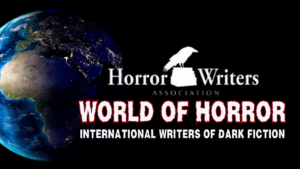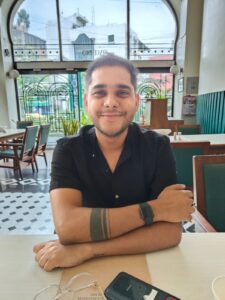World of Horror: Interview with Tejaswi Priyadarshi

Tejaswi Priyadarshi is a splatter-noir author and an HWA Grant Conferee. His two books The Psychopath, The Cannibal, The Lover and Bhang Milkha Bhang have been pivotal in exploring the splatterpunk genre in the Indian literary landscape. His work is focused on layering splatterpunk with local genre and geographic indications and flavors. Tejaswi has an engineering and a business degree, and apart from writing, he also specializes in Digital marketing. He is currently working on a splatterpunk short story collection and a psychological horror novel.

What was it about the horror genre that drew you to it?
I think it was the early acclimatization in my case. The first pieces of entertainment in most forms were from the genre, and the induced curiosity ensured my voraciousness for horror in all its shapes and sizes.
Is there a horror tradition in your country, in your culture? A taste for horror, a market? Not necessarily literature; perhaps oral tradition too.
Yes, India is a treasure trove of lore. There is a plethora of geographically indicative stories that have long acted as the base of Indians’ taste in horror. The stories have been passed verbally and there have been major mentions in literature and cinema as well.
Who are some of your favorite characters in horror, internationally and/or in your own culture?
For me, the Xenomorph takes the crown. It is, by far, the most creatively made and ferocious horror character that I have ever come across. In my own culture, the Daayan (female demon) has always caught my attention.
Do you make a conscious effort to include characters and settings from your country in your writing and if so, what do you want to portray?
All my writing is based in India, and I always ensure that characters and settings that portray my culture and socioeconomic situation form the baseline of my stories. My intention is to expose the audience to the horror while ensuring that they can actually imagine the setting and characters from their day-to-day lives.
If you are not a native English speaker, but write in English, do you first think of horror in your native language or English? How do you draft them in your mind, in English or your mother tongue?
Interesting question. I think of horror in terms of its visual aspects, and the language comes into the picture only when I’m putting my thoughts down on paper.
What has writing horror taught you about the world and yourself?
It has taught me the fact that horror can exist and be derived from even the most far-fetched things. It has also taught me that there exist two entities in a person, one of whom is very capable of doing the most horrific things.
How have you seen the horror genre change over the years? And how do you think it will continue to evolve, both in the US and in your country?
I think horror as a genre has seen a lot of crests and troughs. There have been peaks wherein we have seen phenomenal content being churned out, and there have been times of lull. But it has surely evolved in terms of how many people continue to patronize the genre. In India, specifically, while horror has seen continuous growth, it has never been able to hit commercial peaks. In the coming years, I imagine horror to be more fruitful in terms of what it is bearing for its makers.
Who are some international horror authors you would recommend?
Nick Cutter and Kristopher Triana are two contemporary authors that I’d recommend. Their clarity of thought and visual command are commendable!
What is one piece of advice you would give horror authors today?
My advice to horror authors today would be to explore the genre deeply. There are a lot of opportunities within the multiple subgenres of horror, and they need authors!
And to the writers from your country out there who are just getting started, what advice would you give them?
My advice would be to keep things simple and to be patient. Good things take time 🙂



